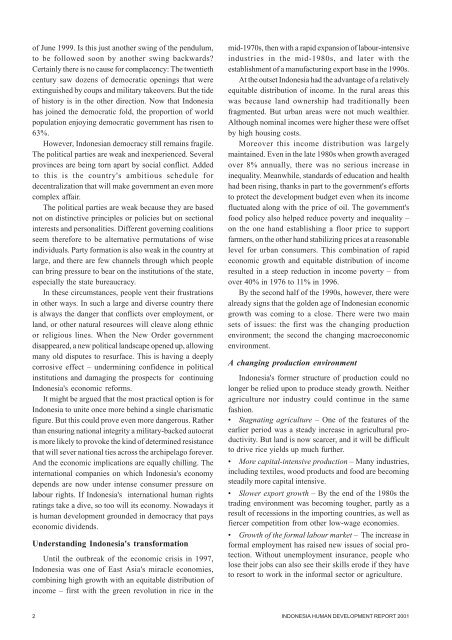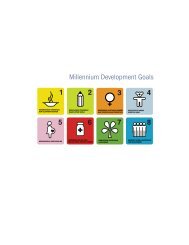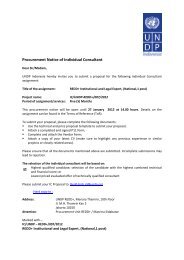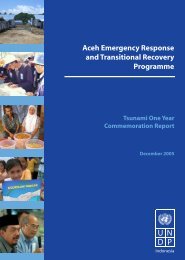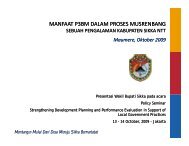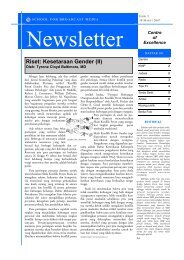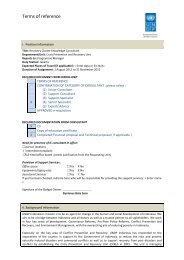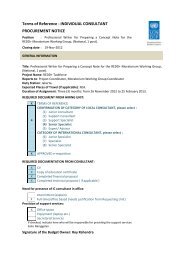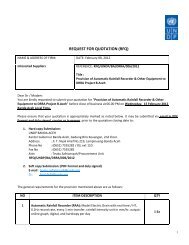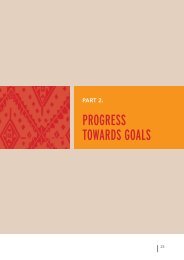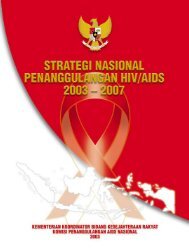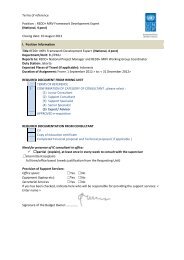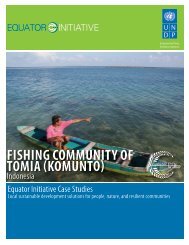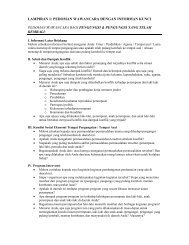Indonesia Human Development Report 2001 - UNDP
Indonesia Human Development Report 2001 - UNDP
Indonesia Human Development Report 2001 - UNDP
You also want an ePaper? Increase the reach of your titles
YUMPU automatically turns print PDFs into web optimized ePapers that Google loves.
of June 1999. Is this just another swing of the pendulum,<br />
to be followed soon by another swing backwards?<br />
Certainly there is no cause for complacency: The twentieth<br />
century saw dozens of democratic openings that were<br />
extinguished by coups and military takeovers. But the tide<br />
of history is in the other direction. Now that <strong>Indonesia</strong><br />
has joined the democratic fold, the proportion of world<br />
population enjoying democratic government has risen to<br />
63%.<br />
However, <strong>Indonesia</strong>n democracy still remains fragile.<br />
The political parties are weak and inexperienced. Several<br />
provinces are being torn apart by social conflict. Added<br />
to this is the country's ambitious schedule for<br />
decentralization that will make government an even more<br />
complex affair.<br />
The political parties are weak because they are based<br />
not on distinctive principles or policies but on sectional<br />
interests and personalities. Different governing coalitions<br />
seem therefore to be alternative permutations of wise<br />
individuals. Party formation is also weak in the country at<br />
large, and there are few channels through which people<br />
can bring pressure to bear on the institutions of the state,<br />
especially the state bureaucracy.<br />
In these circumstances, people vent their frustrations<br />
in other ways. In such a large and diverse country there<br />
is always the danger that conflicts over employment, or<br />
land, or other natural resources will cleave along ethnic<br />
or religious lines. When the New Order government<br />
disappeared, a new political landscape opened up, allowing<br />
many old disputes to resurface. This is having a deeply<br />
corrosive effect – undermining confidence in political<br />
institutions and damaging the prospects for continuing<br />
<strong>Indonesia</strong>'s economic reforms.<br />
It might be argued that the most practical option is for<br />
<strong>Indonesia</strong> to unite once more behind a single charismatic<br />
figure. But this could prove even more dangerous. Rather<br />
than ensuring national integrity a military-backed autocrat<br />
is more likely to provoke the kind of determined resistance<br />
that will sever national ties across the archipelago forever.<br />
And the economic implications are equally chilling. The<br />
international companies on which <strong>Indonesia</strong>'s economy<br />
depends are now under intense consumer pressure on<br />
labour rights. If <strong>Indonesia</strong>'s international human rights<br />
ratings take a dive, so too will its economy. Nowadays it<br />
is human development grounded in democracy that pays<br />
economic dividends.<br />
Understanding <strong>Indonesia</strong>'s transformation<br />
Until the outbreak of the economic crisis in 1997,<br />
<strong>Indonesia</strong> was one of East Asia's miracle economies,<br />
combining high growth with an equitable distribution of<br />
income – first with the green revolution in rice in the<br />
mid-1970s, then with a rapid expansion of labour-intensive<br />
industries in the mid-1980s, and later with the<br />
establishment of a manufacturing export base in the 1990s.<br />
At the outset <strong>Indonesia</strong> had the advantage of a relatively<br />
equitable distribution of income. In the rural areas this<br />
was because land ownership had traditionally been<br />
fragmented. But urban areas were not much wealthier.<br />
Although nominal incomes were higher these were offset<br />
by high housing costs.<br />
Moreover this income distribution was largely<br />
maintained. Even in the late 1980s when growth averaged<br />
over 8% annually, there was no serious increase in<br />
inequality. Meanwhile, standards of education and health<br />
had been rising, thanks in part to the government's efforts<br />
to protect the development budget even when its income<br />
fluctuated along with the price of oil. The government's<br />
food policy also helped reduce poverty and inequality –<br />
on the one hand establishing a floor price to support<br />
farmers, on the other hand stabilizing prices at a reasonable<br />
level for urban consumers. This combination of rapid<br />
economic growth and equitable distribution of income<br />
resulted in a steep reduction in income poverty – from<br />
over 40% in 1976 to 11% in 1996.<br />
By the second half of the 1990s, however, there were<br />
already signs that the golden age of <strong>Indonesia</strong>n economic<br />
growth was coming to a close. There were two main<br />
sets of issues: the first was the changing production<br />
environment; the second the changing macroeconomic<br />
environment.<br />
A changing production environment<br />
<strong>Indonesia</strong>'s former structure of production could no<br />
longer be relied upon to produce steady growth. Neither<br />
agriculture nor industry could continue in the same<br />
fashion.<br />
• Stagnating agriculture – One of the features of the<br />
earlier period was a steady increase in agricultural productivity.<br />
But land is now scarcer, and it will be difficult<br />
to drive rice yields up much further.<br />
• More capital-intensive production – Many industries,<br />
including textiles, wood products and food are becoming<br />
steadily more capital intensive.<br />
• Slower export growth – By the end of the 1980s the<br />
trading environment was becoming tougher, partly as a<br />
result of recessions in the importing countries, as well as<br />
fiercer competition from other low-wage economies.<br />
• Growth of the formal labour market – The increase in<br />
formal employment has raised new issues of social protection.<br />
Without unemployment insurance, people who<br />
lose their jobs can also see their skills erode if they have<br />
to resort to work in the informal sector or agriculture.<br />
2 INDONESIA HUMAN DEVELOPMENT REPORT <strong>2001</strong>


